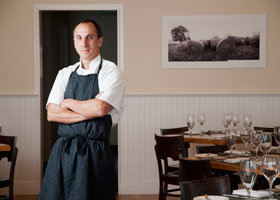Chefs Collaborative Debuts Cookbook
 Chefs Collaborative, a nonprofit dedicated to building a more sustainable food supply by reaching out directly to chefs and sharing best practices, is releasing a cookbook paying homage to its many innovative members and delicious seasonal offerings. The Chefs Collaborative Cookbook features pumpkin curry from chef Alison Costello of Capuchin Soup Kitchen; poached quinces and Armagnac-soaked prunes from chef Peter Hoffman of Black Forty and Thai pork sliders with pickled cucumbers from chef Helen Kennan of Bon Appétit Management Company. Michael Leviton, who owns Lumière in Newton, Massachusetts, and Area Four, a bakery-restaurant and pizza oven in Cambridge, Massachusetts, wrote the book’s forward. In it, he notes that chefs have always been on the leading edge of change, and it was their early adoption of local and sustainably raised ingredients that gave way to farmer’s markets and the fresh food revolution. Below, Leviton chats with E about what it means to be a sustainable chef.
Chefs Collaborative, a nonprofit dedicated to building a more sustainable food supply by reaching out directly to chefs and sharing best practices, is releasing a cookbook paying homage to its many innovative members and delicious seasonal offerings. The Chefs Collaborative Cookbook features pumpkin curry from chef Alison Costello of Capuchin Soup Kitchen; poached quinces and Armagnac-soaked prunes from chef Peter Hoffman of Black Forty and Thai pork sliders with pickled cucumbers from chef Helen Kennan of Bon Appétit Management Company. Michael Leviton, who owns Lumière in Newton, Massachusetts, and Area Four, a bakery-restaurant and pizza oven in Cambridge, Massachusetts, wrote the book’s forward. In it, he notes that chefs have always been on the leading edge of change, and it was their early adoption of local and sustainably raised ingredients that gave way to farmer’s markets and the fresh food revolution. Below, Leviton chats with E about what it means to be a sustainable chef.
1. E Magazine: What led you to cook more sustainably?
Michael Leviton: When I started cooking seriously it was in northern California in the late ’80s, and it was just how you cooked. Before sustainable was a word or a concept, it was really about the search for the best ingredients. And the best ingredients came from people who were passionate about what they were doing whether it was fishing, ranching or raising baby lettuces.
2. E: So when you opened your own restaurant, you were committed to local ingredients?
M.L.: I’d like to tell you “yes.” But 15 years ago in New England there wasn’t the same cult of the ingredients. It took a while for it to come along. New England has come a long way, especially Boston, in terms of being able to source great local product for a much greater period of the year. It’s not just the 10-12 weeks we have corn and tomatoes in the summer—now there’s much more attention paid to local product throughout the year.

3. E: Do you seek out local farms and food providers?
M.L.: We’re constantly on the lookout for more local producers. At the end of the day, it comes down to one very simple principle: The easiest way for me to be the best possible chef is to start with the best possible ingredients. Very often the best ingredients are those that have traveled as little as possible and that are not raised not in an industrial agriculture model that is all about maximizing efficiency in terms of getting a particular product to market. I want to buy from someone who is all about quality.
4. E: Is it a challenge finding local ingredients in New England with the seasonal changes?
M.L.: Of course. Early spring is the toughest time of the year to cook locally in New England. Because everyone has this expectation come April that we will have asparagus and peas and fava beans and artichokes and all these things that we traditionally associate with springtime. They’re not even in the ground here. We need to make decisions that balance local and sustainable and organic and humanely raised with the ability to keep our doors open and customers coming through them. If In April, when everybody else has asparagus, I don’t have it, and I’m still serving root cellar vegetables and grains, they’re not coming to my restaurant.
5. E: Do you have to make certain concessions to cost?
M.L.: As much as I would love to use local grain, the price of a sack of flour is five times as much if I want to use local. I can’t pass that cost along to the consumer. They would think I’m high as a kite if I said “That muffin is eight bucks.”
6. E: Is this an issue—the higher cost of local foods—that the Chefs Collaborative is trying to address?
M.L.: The collaborative has a huge number of folks in its network. And you have some people who maybe can make that decision because they have a small restaurant, they have a very loyal clientele, they may be in an area that supports everything hyper-local. Then you’ve got people running huge institutional kitchens where everything is done on price. Sustainability is going to be different for everybody on that wide-ranging spectrum and I think at the end of the day, I joke about it, but the first rule to running a sustainable restaurant is “keep the doors open.”

